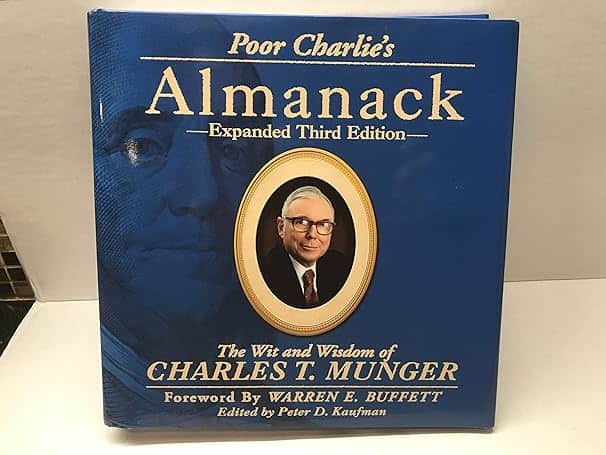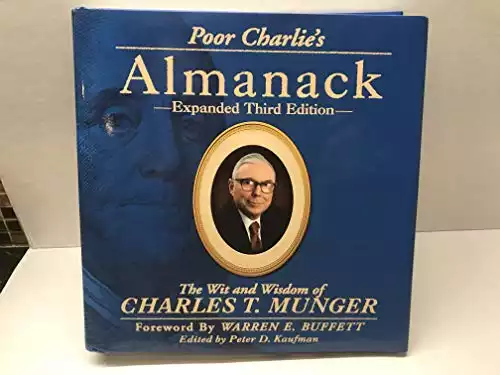Overview : Poor Charlie’s Almanack
- Book Title: Poor Charlie’s Almanack
- Author: Charles T. Munger
- Publication Date: 2005
- price: $67.96
- Pages: 512
Overview of the Book
The book is authored by Charlie Munger, the Vice Chairman of Berkshire Hathaway and an iconic investor, lawyer, and philanthropist. Known for his intellectual rigor and wit, Munger's teachings emphasize multidisciplinary thinking and decision-making.
Introduction: A Masterclass in Multidisciplinary Thinking
In the vast sea of financial literature, "Poor Charlie's Almanack" stands as a lighthouse, guiding readers through the fog of complex decision-making and investment strategies. This comprehensive review delves into the wisdom of Charlie Munger, Warren Buffett's right-hand man at Berkshire Hathaway, and explores how his insights can revolutionize not just your investment portfolio, but your entire approach to life and learning.
Book Summary: Unveiling the Mind of a Financial Genius
"Poor Charlie's Almanack" is not your typical finance book. It's a beautifully crafted compilation of Munger's speeches, essays, and witticisms that spans disciplines far beyond the realm of investing. At its core, the book is a celebration of multidisciplinary thinking, encouraging readers to build a "latticework of mental models" drawn from fields as diverse as psychology, physics, and history.
"Develop into a lifelong self-learner through voracious reading; cultivate curiosity and strive to become a little wiser every day." - Charlie Munger
Analysis of Themes: The Pillars of Munger's Philosophy
1. Mental Models and Multidisciplinary Learning
Munger's emphasis on mental models is perhaps the book's most revolutionary concept. By understanding and applying frameworks from various disciplines, investors can make more informed decisions and avoid common pitfalls. This approach is particularly relevant in today's interconnected financial markets, where global events and technological advancements can rapidly impact asset values.
2. The Psychology of Human Misjudgment
One of the book's standout sections is Munger's famous speech on cognitive biases. By understanding these psychological traps, investors can improve their decision-making process and potentially outperform the market. This insight is invaluable in an era where behavioral finance is increasingly recognized as a crucial factor in market dynamics.
3. Simplicity in Investing
In contrast to complex financial instruments and high-frequency trading strategies, Munger advocates for a simpler approach to investing. His focus on understanding businesses and investing in what you know resonates with value investing principles and serves as a counterpoint to the often frenzied nature of modern markets.
Writing Style: Wisdom Wrapped in Wit
Munger's writing style is refreshingly direct and often humorous. The book's format, which includes anecdotes, speeches, and Q&A sessions, keeps the reader engaged and allows Munger's personality to shine through. This approach makes complex financial concepts more accessible and memorable.
Strengths and Weaknesses: A Balanced Perspective
Strengths:
- Comprehensive coverage of multidisciplinary thinking
- Rich in practical wisdom applicable beyond investing
- Beautifully designed with engaging visuals
- Offers unique insights into the mind of a legendary investor
Weaknesses:
- Non-linear structure may be challenging for some readers
- Some concepts may require additional background knowledge
- Limited focus on specific investment techniques
Comparison to Other Works: Standing Out in the Financial Library
While "Poor Charlie's Almanack" shares similarities with other investment classics like Benjamin Graham's "The Intelligent Investor" or Peter Lynch's "One Up On Wall Street," its multidisciplinary approach sets it apart. Unlike books that focus solely on financial metrics or stock-picking strategies, Munger's work emphasizes the importance of broad-based knowledge in making sound investment decisions.
Compared to more recent works on behavioral finance, such as Daniel Kahneman's "Thinking, Fast and Slow," Munger's book offers a more practical application of psychological principles to investing and decision-making.
Relevance to Current Market Trends
In an era of cryptocurrencies, fintech innovations, and rapidly changing market dynamics, Munger's timeless wisdom serves as a stabilizing force. His emphasis on understanding fundamental business principles and avoiding speculative frenzies is particularly relevant in today's volatile markets.
While the book doesn't directly address recent phenomena like blockchain technology or ESG investing, its principles can be applied to evaluate these trends critically and make informed decisions in an ever-evolving financial landscape.
Highlights from Poor Charlie’s Almanack Review
- Wisdom of Charlie Munger: Collects the best insights from Warren Buffett's partner.
- Mental models: Emphasizes using diverse models for better decision-making.
- Value investing: Advocates for long-term, thoughtful investing strategies.
- Focus on rationality: Encourages clear thinking and avoiding biases.
- Lifelong learning: Stresses the importance of continuous self-improvement and education.
- Humility in success: Demonstrates Munger's approach to success through humility and patience.
- Psychology of human behavior: Explores how understanding psychology can improve decision-making.
Conclusion: A Must-Read for the Discerning Investor
"Poor Charlie's Almanack" is more than just a book about investing; it's a guide to thinking better and living a more informed life. Whether you're a seasoned investor, a business professional, or simply someone seeking to improve your decision-making skills, this book offers invaluable insights that can enrich your understanding of finance and the world at large.
In a financial world often dominated by short-term thinking and complex algorithms, Munger's emphasis on simplicity, continuous learning, and ethical behavior serves as a refreshing and necessary perspective. This book is an essential addition to any investor's library and a worthy investment in your intellectual growth.





